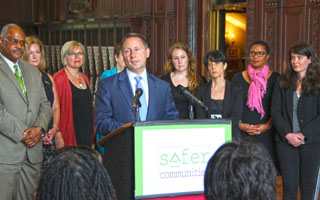 Westchester County Executive Robert P. Astorino, joined by Sarah Tubbs, advocates, college officials and law enforcement officials at Manhattanville College in Purchase, today unveiled a four-point plan to improve Governor Cuomo’s campus sexual assault bill, which is pending in the State Legislature. Astorino had previously been asked to sign onto Cuomo’s proposal but said the bill needed to be strengthened before he could support it, navigate here to learn more.
Westchester County Executive Robert P. Astorino, joined by Sarah Tubbs, advocates, college officials and law enforcement officials at Manhattanville College in Purchase, today unveiled a four-point plan to improve Governor Cuomo’s campus sexual assault bill, which is pending in the State Legislature. Astorino had previously been asked to sign onto Cuomo’s proposal but said the bill needed to be strengthened before he could support it, navigate here to learn more.
“In Albany and Washington all too often we see good intentions go awry,” said Astorino. “I’m interested in developing a good policy that can actually work in the real world and better protect victims of sexual assault, and I think we are doing that with these improvements.”
As a measure of his commitment to protecting victims of sexual assault, Astorino said part of his proposal would be acted on immediately in Westchester: making enhanced training available to all local police departments for free and providing funding out of his budget to train sexual assault victim advocates.
Astorino said his chief concern with the proposed state bill is that it imposes an unworkable new standard of “affirmative consent,” which would then be adjudicated by campus “conduct commissions,” with the result of adding more confusion, rather than clarity, to an already complex issue. Cuomo has yet to receive the support of either party or either state legislative body for this new paradigm that conflicts with state penal law. Astorino said his plan seeks to protect victims and prevent colleges from adjudicating sex crimes.
“Colleges are good at educating young adults,” Astorino said. “They are not good at investigating and prosecuting violent felonies, especially sexual assaults. That’s not their job. Not only are colleges ill-equipped to investigate such crimes, but an inherent conflict of interest exists when colleges attempt to do so. Colleges have a right to create their own code of personal conduct for students, but they no longer should be defining and adjudicating crimes. That should be left to police and district attorneys.”
Astorino cited recent alleged sexual assaults at Hobart & William Smith Colleges in Upstate New York and Stony Brook in Long Island, as examples of cases that were terribly mishandled by the colleges.
Sarah Tubbs, who was treated poorly by Stony Brook officials and even forced to “prosecute” her alleged attacker, attended the press conference and supported Astorino’s plan.
“I learned the hard way that colleges have no business handling rape cases. I honestly feel as though I was victimized twice, first by my attacker and then by the systemic failures of my college,” said Tubbs. “I also think having a caring, independent advocate on my side could have changed everything.”
Under Astorino’s proposal:
• Colleges would be required to report knowledge of an alleged rape or sexual assault to local police immediately. Failing to do so would result in a Class B Misdemeanor for any salaried college employee that had direct knowledge of an alleged sex crime but failed to report it to police. This is the same penalty as failure to report knowledge of alleged child abuse. Current law requires colleges to report violent felonies, but not sexual assaults if the victim chooses not to. That would change under Astorino’s proposal. “A victim has the right not to report a rape to police, but a college official does not,” said Astorino.
• Colleges would be required to provide for an independent victim advocate (IVA) by entering into formal agreements with state-certified rape crisis agencies. A 1-800 hotline phone number would be prominently displayed throughout campuses and provided to all students at the beginning of each school year. A student could directly call the IVA or would be put in touch with the IVA by college officials to ensure the victim receives support and advice from an independent advocate without any potential conflict of interest.
• Police departments would be required to incorporate “Start by Believing” training into their instructional curriculum. “Start by Believing” aims to improve trust and cooperation between victims and investigators by improving the sensitivity and knowledge of law enforcement officials, especially those responsible for the initial response. In Westchester, the enhanced training will be offered by the Westchester County Department of Public Safety at the county’s police academy free of charge to all local departments.
• Adopt my proposed Victims’ Bill of Rights that addresses protocols on rape kits and exams, and interactions with the colleges, police and victim advocates.
In addition, Astorino pledged $20,000 to expand our sexual assault victim advocate program in Westchester. “This money will help increase the pool of well trained, independent advocates,” Astorino said.
“Rob Astorino should be commended not only for recognizing the critical role of the independent victims advocate but also for his leadership in putting actual dollars behind a training program in Westchester to increase the number of advocates,” said John Savage, Executive Director of Westchester Community Opportunity Program, whose Victims Assistance Services division provides expert advocacy and services for all victims of sexual assault.
“Violent crimes should and must be handled by law enforcement. And when you are dealing with sexual assaults there is a fast closing window for preserving the integrity of the evidence. All the more reason to call the police immediately,” said George Longworth, Commissioner of the Westchester Department of Public Safety. “County Executive Astorino’s proposal to remove colleges from responsibility dealing with violent felonies is the correct one and one that will bring greater clarity to jurisdiction and greater odds for securing justice.”
“Rape is a very serious crime and should be treated as such,” Astorino said. “We have seen far too many examples of rape cases on college campuses being completely bungled. My plan is not a panacea. Parents need to talk with their sons and daughters about acceptable behavior. But government can play a role and my plan seeks to improve upon Governor Cuomo’s proposal with the shared goal of protecting victims and ensuring justice as best we can.”
In Westchester, victims of sexual assault, regardless of who they are or where the assault took place, should contact the local police by calling 911. For advocacy, counseling, support and legal services, they can also contact:
• Victims Assistance Services: 855-827-2255
• Hope’s Door: 888-438-8700
• My Sisters’ Place: 800-298-7233
• Westchester County Office for Women: 914-995-5972
• Westchester County Family Justice Center: 914-995-3100
• Alianza Latina Contra Agresión Sexual (En Español): 855-252-7942
“I commend Westchester County Executive Rob Astorino for taking a stand on the important issue of sexual assault on college campuses,” said Dutchess County Executive Marcus Molinaro. “Campus sexual assault is a serious problem that requires immediate action. County governments are doing all they can. In Dutchess County we are leading on this issue through a partnership with Family Services and other local service providers by creating a Sexual Assault Response Team (SART). Bringing together stakeholders, from Albany to the local governments and nonprofits to the higher education institutions, is the only way we will stop the violence on our college campuses.”
Orange County District Attorney Dave Hoovler added: “Sexual assault crimes are an extremely sensitive and serious issue that should be handled by experts in law enforcement. I commend County Executive Astorino for his leadership on proposing these critically important improvements to the bill, and am in full support of the proposal.”
RECOMMENDED PROTOCOLS FOR SEXUAL ASSAULT RESPONSE
VICTIMS’ RIGHTS
ALL victims of sexual assault, domestic violence, dating violence, and/or harassment and stalking are entitled to certain rights to help ensure their personal safety, health and comfort, well-being, and community safety. The goal of these rights is to encourage more victims to report their assaults and reduce further trauma by eliminating as many barriers to reporting sexual offenses as possible.
Victims have the right:
1) First and foremost, to be BELIEVED by any and all professionals with whom the victim shares his/her story;
2) To be treated with respect, sensitivity and dignity at all times;
3) To immediately be referred to, and meet with, a neutral, compassionate, trained NYS CERTIFIED INDEPENDENT VICTIM ADVOCATE (IVA), who will be available 24 hours a day, 7 days a week ;
4) To have victim advocates, sexual assault professionals, and law enforcement work with the victim as a TEAM;
5) To have the IVA, at the victim’s request, serve as a liaison and communicate, where appropriate, with the team on his/her behalf to minimize trauma of retelling incident details;
6) To have her/his case referred to law enforcement, trained in “Start by Believing,” who will lead the sexual assault investigation;
7) To be notified and updated on the status of the investigation and receive copies of all reports as permitted by law;
8) To have law enforcement keep all felony assault cases open indefinitely by retaining evidence and information;
9) If 18 years of age or older, to determine whether to participate in a criminal investigation or to delay participating, or to agree to a partial or full investigation;
10) To have evidence stored for an indefinite period, including at least up until the time of the expiration of the statute of limitations for the crime or even indefinitely;
11) To be free from questions regarding irrelevant sexual history;
12) To have access (including transportation) to the Forensic Acute Care Team (FACT) for appropriate medical treatment, including prophylactic medications and/or forensic exam (rape kit);
13) To have the option of anonymous testing and evidence collection (through assignment of a tracking number) and to decide if that evidence should be analyzed;
14) To not provide insurance information at any time in relation to medical treatment/FRE (forensic rape exam); and
15) To obtain results of all forensic/medical exams as soon as testing has been completed.






